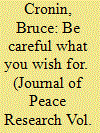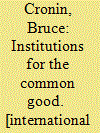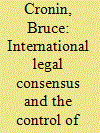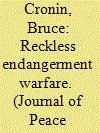| Srl | Item |
| 1 |
ID:
101696


|
|
|
|
|
| Publication |
2010.
|
| Summary/Abstract |
Most theories that seek to explain the relationship between major war and the creation of new political orders posit a direct link between the interests of the winning states and the type of order that emerges. We tend to assume that since most wars are fought for specific purposes and a defined goal, the aftermath of the conflict will reflect the interests and preferences of the winning parties. This article challenges this approach, arguing that the necessity of securing public support and winning allies forces states to make public commitments for a postwar reconstruction that they might otherwise avoid. During the course of the war, states unintentionally limit their options for the postwar reconstruction by publicly articulating a set of 'war aims' that are designed to rally public support and win over potential allies. Since war aims are as much statements of propaganda as of policy they often do not reflect the state interest per se. However, once articulated, they become the official policy of the coalition, and political leaders are forced to implement their principles as the foundation for the new order.
|
|
|
|
|
|
|
|
|
|
|
|
|
|
|
|
| 2 |
ID:
050052


|
|
|
|
|
| Publication |
Cambridge, Cambridge University Press, 2003.
|
| Description |
viii, 234p.
|
| Series |
Cambridge studies in international relations; no. 93
|
| Standard Number |
052153187X
|
|
|
|
|
|
|
|
|
|
|
|
Copies: C:1/I:0,R:0,Q:0
Circulation
| Accession# | Call# | Current Location | Status | Policy | Location |
| 047460 | 341.481/CRO 047460 | Main | On Shelf | General | |
|
|
|
|
| 3 |
ID:
064698


|
|
|
|
|
| Publication |
Jul-Sep 2005.
|
|
|
|
|
|
|
|
|
|
|
|
|
|
|
|
| 4 |
ID:
121796


|
|
|
|
|
| Publication |
2013.
|
| Summary/Abstract |
This article examines how military organizations that are generally committed to following the laws and customs of war exploit what the author terms 'the collateral damage exemption', by employing legally-sanctioned war-fighting strategies that result in significant numbers of civilian casualties. This exemption shields combatants from legal liability for 'incidental' or 'inadvertent' civilian losses and the destruction of civilian objects that may occur during lawful actions. The author argues that military strategies which promote the use of overwhelming force under conditions that are likely to adversely affect the civilian population on a significant scale push the boundaries of legal behavior. Under these conditions, collateral damage is not inadvertent, but the calculated results of policy decisions. Most academics, journalists, and political leaders focus on blatant violations of International Humanitarian Law (IHL), for example, deliberate attacks on civilian populations. However, these actions are in many ways the least interesting from both a policy and scholarly perspective. This is because such violations are usually unambiguous, easily detected, and difficult to defend. More insidious are practices that deliberately straddle the line between legitimate action and violation by exploiting the collateral damage exception to IHL. This article demonstrates that high rates of civilian casualties that occur under the shroud of legality threaten the integrity of the laws and customs of armed conflict.
|
|
|
|
|
|
|
|
|
|
|
|
|
|
|
|